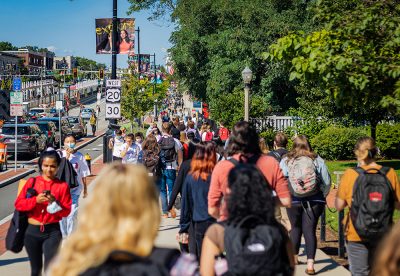Boston University increased the credit requirement for the Dual Degree Program from 144 to 160 credits, effective for those admitted to the program during or after Fall 2024, according to University officials.

BU aims to align with the requirements outlined by the New England Commission of Higher Education, according to Amie Grills, the associate provost for undergraduate affairs at BU. NECHE lists a dual degree as “the equivalent of a full year of study beyond the first baccalaureate degree.”
Steven Jarvi, senior associate dean for student academic life in the College of Arts and Sciences, said BU was not at the same level as other colleges.
“We are not in line with many of our paired institutions in that it was a pretty small number of total credits to complete an additional degree,” Jarvi said.
Despite the number of requirements increasing by 16 credits, the equivalent to four four-credit classes, Jarvi thinks the amount of students participating in the program will remain the same “in the long run.”
“I think that a student who wants that credential, and a meaningful credential, of a second degree will not be discouraged by these new requirements,” Jarvi said.
Grills wrote that the change will prepare students for the significant commitment that a dual degree requires.
“I think occasionally students are optimistic that they will be able to do [the dual degree] more quickly and then disappointed when it takes longer than they had hoped [or] anticipated, so hopefully the requirement of 160 credits will make this clearer from the beginning,” Grills wrote.
Grills added that 70% of students participating in the program were already completing 160 credits or more.
Kat Mor, director of the undergraduate programs office for the College of Engineering, wrote in an email that 160 credits is “more realistic” for engineering students pursuing a dual degree.
“I think the reality is that in order to do a [Dual Degree Program] with ENG, students would have to complete well over 144 credits anyway,” Mor wrote, adding that engineering majors typically take about 131 to 135 credits without a dual degree.
Liz Vassallo, director of undergraduate student services at the Wheelock School of Education and Human Development, works with students who want to pursue dual degree programs in Wheelock.
“It doesn’t seem like when I say 160 [credits] anyone’s like ‘Oh my God, I can’t possibly do that,’ because of all the requirements with Wheelock and all the requirements with the other major that they’d be adding on, and potentially with the language requirements, they’re going to get to 160 just based on meeting all those requirements,” Vassallo said.
The new credit requirements come on top of other changes being made to the Dual Degree Program, which include lowering the minimum GPA requirement from a 3.0 to a 2.0 in each program and removing the limit on the amount of summer courses a student in the program can take, Grills wrote.
Avolie Huang, a sophomore in the School of Hospitality Administration and Questrom School of Business, will graduate with 149 credits. Huang considers herself “lucky” to be in the group prior to the credit change.
“I would really reconsider [dual degree] if there was that set 160 minimum because I really wanted to do this and graduate early,” Huang said.
Huang said she chose BU because of the flexibility for students taking “any types of degrees they want to” and believes the credit requirement should vary for the type of dual degree a student is completing.
“For Business and SHA, there’s a lot of overlap,” Huang said. “I don’t feel like 160 [credits] is a fair requirement because then I would have to take a lot of extra courses that I probably wouldn’t have interest in.”
Despite her opposition to the 160 credit requirement, Huang said she felt that the dual degree program had a lot of value.
“For people who are truly passionate between two things or want to explore two different career paths, a dual degree would be optimal,” Huang said.
Jarvi added that while the Dual Degree Program is valuable, it is not the only way students can get beneficial experience for future career paths.
“If you’re doing things that are meaningful to you, then that’s what’s important,” Jarvi said. “So when you’re applying to graduate school or interviewing for a job, you can say these are the things I pursued because this is what’s important to me.”

















































































































